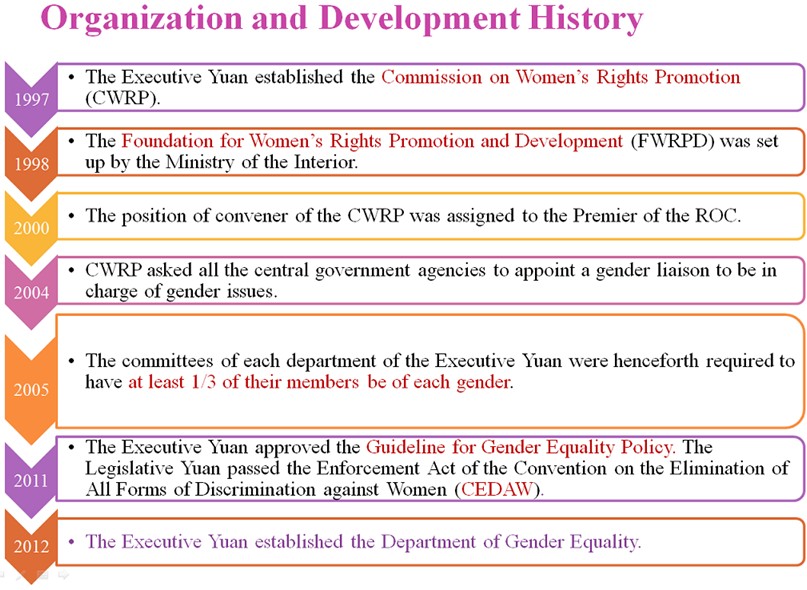To promote lateral communication among various government agencies in order to strengthen the overall effectiveness of the government's enforcement of women's rights and interests, the Executive Yuan established the task force-level Committee of Women's Rights Promotion (CWRP) on May 6, 1997, incorporating the advocacy and proposals of representatives from women's organizations, scholars and experts into the country's highest decision-making mechanisms. Furthermore, the enactment of government legislation and policy works to protect women's rights on fair and rational grounds and promote women's rights efforts.
From its establishment till the end of 2011, the CWRP was run by 8 commissions, which held 37 committee meetings and 5 extraordinary sessions. A great number of women's rights policies and projects were introduced during this period, including the Foundation for Women’s Rights Promotion and Development established through the funding of the Ministry of the Interior in 1998, which opened up channels of communication between the government and the private sector and led to the creation of a women's information exchange center, Also during this period, the CWRP reached achievements such as the development of gender statistics indicators, the establishment of the Women’s Policy Guidelines, Women’s Health Policy, and Policy White Paper on Female Labor; the passage of the resolution that every Executive Yuan committee shall have at least 1/3 of its membership be of each gender, the promotion of the establishment of gender equality task forces in each ministerial-level agency, the development of national indicators on the impact of major government policies on gender equality, the passage of gender-friendly transportation policies, the establishment of the Taiwan Women’s Center, the enactment of the Act of Gender Equality in Employment and Gender Equity Education Act, the development of the White Paper on Gender Equity Education, the enactment of the CEDAW Enforcement Act, and the development of the Gender Equality Policy Guidelines. The CWRP's efforts were very fruitful in and fundamental to the realization of a society where all genders are treated more equitably.
The Executive Yuan underwent reorganization on January 1, 2012, during which the nation's first authoritative unit dedicated to gender equality—the Department of Gender Equality—was established. The creation of the department was in response to increased international attention on gender equality issues and to strengthen policies directed at the promotion of gender equality in the workplace. Also during the restructuring period, the CWRP was expanded and became the Gender Equality Committee (GEC). The GEC is currently staffed by the Department of Gender Equality and helps in integrating gender equality policies across various government bodies and directing central and local governments as they put gender mainstreaming into practice. Such work allows the whole government to implement gender equality and adopt various gender perspectives. The GEC’s establishment is an important milestone in the promotion of gender equality work.
Below are the primary work items decided by the GEC :
1. Implementation of CEDAW:
The Enforcement Act of CEDAW was put into effect on January 1, 2012. It requires the provision and handling of training, regulations, and review of measures for central and local governments, the drafting of national reports on the elimination of gender discrimination and the establishment of a compliance assessment system, and arrangements for guidance on the prevention of gender discrimination.
2. Enactment of Gender Equality Policy Guidelines:
The Gender Equality Policy Guidelines were announced on December 19, 2011. Amendments were made in 2017 and 2021 to direct policymaking. These guidelines advocate women's rights and gender equality in 6 main categories: (1) power, decision-making, and influence; (2) employment, economy, and welfare; (3) education, culture, and media; (4) personal security and justice; (5) health, medical service and care; and (6) the environment, energy, and technology. In addition, related initiatives were introduced to direct various government bodies in the adoption of the Gender Equality Policy Guidelines.
3. Gender mainstreaming in central and local governments:
Gender equality and gender mainstreaming units have been assembled within central and local government bodies to develop proper implementation tools and practices for these objectives; to arrange for gender mainstreaming training for civil servants at the national and local levels; to promote the development and implementation of assessments on the influence on each gender of government plans, laws, and regulations; to step up teaching of gender awareness; and to vest local women's rights promotion committees with greater functionality.
4. Global participation and local training:
The GEC participates in gender-related discussions of APEC and in meetings organized by the United Nations Commission on the Status of Women (CSW), supervises and regulates the adoption of innovative practices that enhance women's economic involvement by government bodies, and keeps abreast of international trends in the promotion of gender equality and women's rights-related work. The GEC also arranges local training in gender equality and facilitates economic exchanges and policy dialogues among the central and local governments and the public. Such exchanges promote gender-equality awareness in local governments and private organizations and, together, help to effect gender equality work.
The GEC serves as a nexus that consolidates the expert knowledge of the government and the private sector, offering policy planning, counsel, supervision, and resource integration that assist in acclimatizing the central and local governments to prevailing world trends. It brings implementation of women's rights and gender equality issues of the government and the private sector into accord, strengthens the partnership between the two sectors in their work on gender equality and women's rights, and ensures close contact between women’s associations inside and outside Taiwan. In the future the GEC, through its three-level discussion mechanism of operation, regulation, and integration, will continue bringing gender perspectives into the government's policies and planning with innovation and vitality as well as contributing towards building a diverse society in Taiwan where all people are respected and accepted in order to usher in a new era of equality for woman and all genders.
